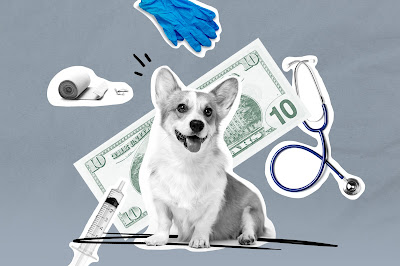What is Pet Insurance and How does it work
What is Pet Insurance and How does it work? About Pet Insurance If you're like me, you love your pets. But sometimes things happen that can be hard on them. If your pet needs medical care or an emergency surgery, pet insurance can help pay for it. Here's what you need to know about this type of coverage:
There are a lot of pet insurance plans out there, and they're not all the same
There are a lot of pet insurance plans out there, and they're not all the same. In fact, you may have noticed that some of them seem to be pretty similar to others (for example: "Our policy covers up to $100 worth of veterinary bills per claim"). The reason for this is because it's actually possible to find a number of different policies from different companies that cover various things. For example:
- Some policies will only cover emergency care if your pet has an accident while at home; others require that you take him or her directly into the vet's office immediately after being injured outside.
- Some companies offer extra protection in case something unexpected happens like illness or injury during travel or boarding (e.g., plane delays). If your dog has been sick for several days and needs medication every day until he recovers completely—or if he needs surgery after breaking his leg playing soccer—this could help pay some bills on its own even without having any other coverage through us!.
You can choose the deductible and annual limits that meet your budget needs
- Deductible: The amount you pay out of pocket in case of an emergency, such as a car accident or medical emergency. It’s standardized at $1,000 per incident for any insurance policy with a single deductible and $2,500 per incident for any policy with multiple deductibles (more on this later). Some policies have higher deductibles than others — especially if you have more accidents or illnesses in one year than others — but this is generally considered standard across most plans.
- Annual limit: The maximum amount of coverage that will be provided by your plan during each calendar year (or 12 months). Most plans offer unlimited coverage up until the point where they begin charging premiums again; however some plans may set an annual cap so there are no surprises when it comes time to renew your policy (for example: If we had let's say $20k worth of damage done to our car but only had $15k worth left on our credit union loan then we'd probably be able to keep getting new plates without paying anything extra).
You can usually choose your own vet
If you want to pick your own vet, that's fine. You can also choose to go with a non-network vet if you have one in mind. But keep in mind that if you use an outside vet for more than one year, your insurance company may increase or decrease how much they cover for visits.
Some plans have an annual limit on how much they will pay for vet visits—and some even require that all new patients be seen by the plan's network of doctors before getting coverage for any future appointments with outside physicians.
After you pay an initial fee, you don't have to worry about more costs later on
Once you join, there are no more costs. That's right: once you pay an initial fee to get started with the plan and make payments toward your deductible, all future payments will be waived if they're due on the first day of each month—that is, no matter how many months have passed since your last payment was made.
So when does it end? Well, the answer is simple: whenever you want it to end! If at any time during that same period (or any subsequent one) a new goal or milestone needs to be met in order for coverage to continue as well as receive regular updates about how well things are going overall so far then yes this would also apply but otherwise not necessarily because again we're talking about getting help from someone else here who wants nothing more than seeing us succeed so just don't worry about anything else too much because everything will go back into place eventually anyway once we get there ourselves...
Pet insurance isn't just for medical emergencies
Pet insurance is more than just a way to cover medical emergencies. It’s also an investment in your pet’s future, allowing you to save on vet bills as they arise and take care of routine health issues that could otherwise be costly and inconvenient.
Pet insurance can cover things like:
- Routine visits to the vet (including vaccines, blood tests, flea treatment)
- Grooming services like haircuts and nail clipping—and other beauty treatments! (Be sure to check with your vet about the type of coverage you need.)
- Boarding at a kennel or boarding facility if your dog needs a place away from home for an extended period of time (such as vacation). This could include trips out of town with friends or family members who own dogs too! You may even consider paying for this if it helps keep everyone happy!
Many policies do not cover pre-existing conditions
If you’re looking for pet insurance, it can be tempting to buy a policy that covers every conceivable need. However, some policies do not cover pre-existing conditions and others charge higher premiums as a result of these exclusions. If your pet has an existing condition before becoming insured by an insurer (such as diabetes or cancer), this will be reflected in the cost of their policy.
Some policies don't cover non-emergency conditions like dental cleanings and vaccinations
You might have heard that some policies don't cover non-emergency conditions like dental cleanings and vaccinations. This is true, but it's important to understand what your policy covers and what it doesn't.
The best pet insurance policies will pay for routine care such as annual checkups, vaccinations and other medical expenses if you need them. They'll also cover emergency services like accident treatment or surgery if something unexpected happens to your pet—like a broken leg from playing too hard with his favorite toy (we've all been there).
But some policies exclude routine care from their coverage—so make sure you know exactly what kind of care is covered by the policy before buying one! If you're going on vacation soon with Fido in tow but haven't yet made arrangements for him getting his annual shots while you're gone...don't worry! It's possible that these services won't be covered by most pet insurance providers anyway; especially given how expensive they can get over time."
Not all pet insurance plans are created equal, but pet insurance can help you care for your pets no matter what happens
Pet insurance is not the perfect solution for all pet owners, but it can be a good option for many. If you have a dog or cat that requires medical attention, then pet insurance may be worth considering. If your animal has an accident and needs stitches or other medical treatment that costs more than its deductible amount, you'll want to make sure that your vet bills are covered by insurance first—otherwise those expenses could leave you with no money for food or medications at all.
Also consider how much time and effort it takes to keep up with vet bills when they're not covered by another source (like work). This could make life difficult if an unexpected bill arises from something minor like fainting every few days due to stress during work hours instead of being able to get home early enough before everyone else gets off work too!
Conclusion
Pet insurance is a great way to help protect your pets. While it doesn't offer the same level of coverage as human insurance, it can still provide peace of mind if you ever need some extra funds in case one of your beloved pets falls ill or needs surgery. If you're looking for a new way to care for your furry friend, consider signing up for pet insurance today!



